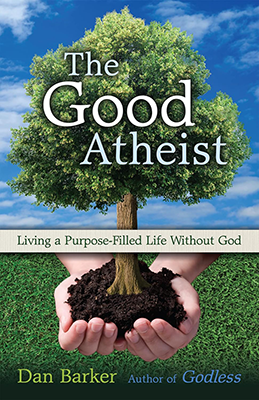The Good Atheist
“The Good Atheist: Living a Purpose-Filled Life Without God” by Dan Barker is a thought-provoking exploration of atheism and secular humanism, offering insights into how one can live a meaningful and fulfilling life without belief in a higher power. Here’s a summary:
Introduction to Atheism: Barker introduces the concept of atheism and defines it as the absence of belief in gods or deities. He discusses the historical and cultural context of atheism, exploring how atheistic perspectives have been marginalized and stigmatized throughout history.
Living Without God: Barker shares his personal journey from devout Christian evangelist to outspoken atheist. He discusses the reasons why he ultimately rejected religious belief and embraced atheism, including skepticism, critical thinking, and a desire for intellectual honesty.
Finding Meaning and Purpose: Barker explores how atheists can find meaning and purpose in life without relying on belief in a higher power. He discusses secular humanism as a philosophical framework that emphasizes reason, compassion, and ethical living as the basis for a fulfilling life.
Morality and Ethics: Barker discusses the moral and ethical implications of atheism, arguing that atheists can be moral and ethical without belief in divine commandments or supernatural authority. He explores secular approaches to ethics, such as utilitarianism, virtue ethics, and human rights.
Community and Belonging: Barker explores the importance of community and belonging for atheists, who often face social isolation and discrimination in religious societies. He discusses the role of atheist organizations and communities in providing support, fellowship, and advocacy for secular values.
Dealing with Death and Loss: Barker discusses how atheists can find comfort and solace in the face of death and loss without belief in an afterlife. He explores secular approaches to coping with grief and mourning, emphasizing the importance of living fully in the present moment.
Challenges and Obstacles: Barker acknowledges the challenges and obstacles that atheists may face in a predominantly religious world, including discrimination, prejudice, and social stigma. He offers advice for navigating these challenges with resilience and integrity.
Conclusion: Barker concludes by emphasizing the importance of living an authentic and purpose-filled life, guided by reason, compassion, and a commitment to human flourishing. He encourages atheists to embrace their identity and values, while also engaging with the broader society in pursuit of social justice and equality.
Overall, “The Good Atheist” offers a compassionate and insightful exploration of atheism and secular humanism, providing guidance and encouragement for atheists seeking to live meaningful and fulfilling lives in a world without gods. Barker’s personal anecdotes, philosophical reflections, and practical advice make the book a valuable resource for atheists and non-atheists alike.

